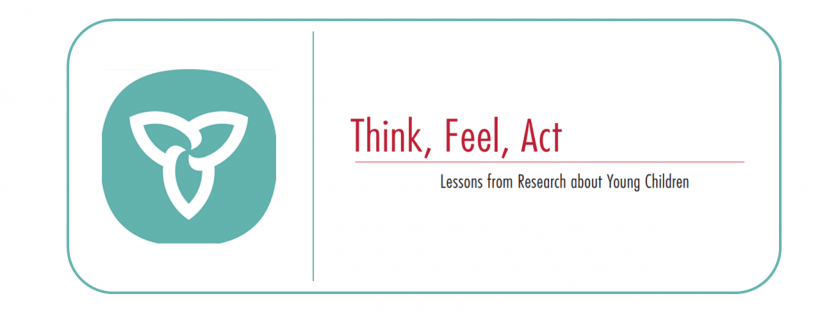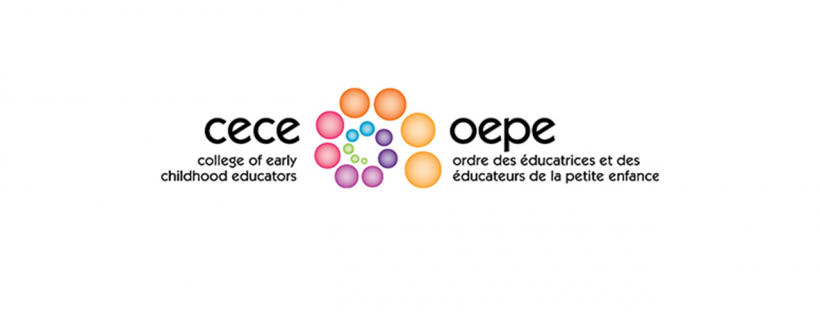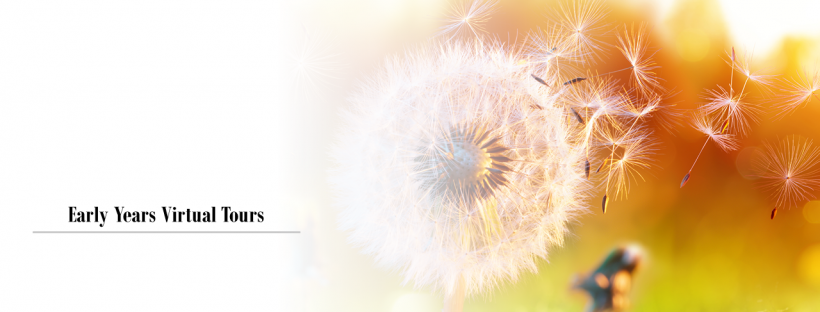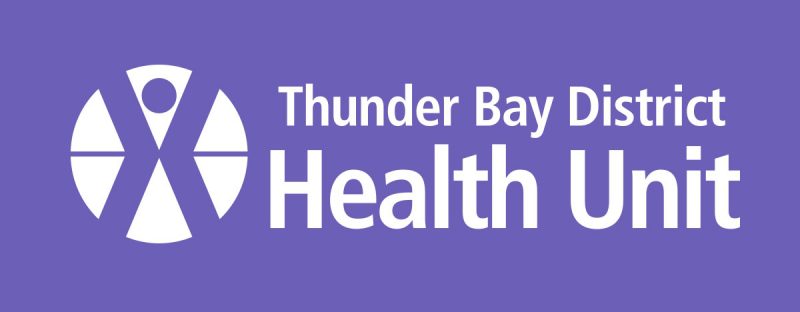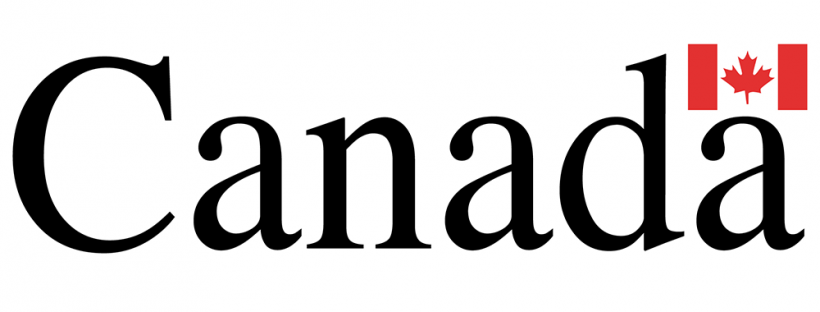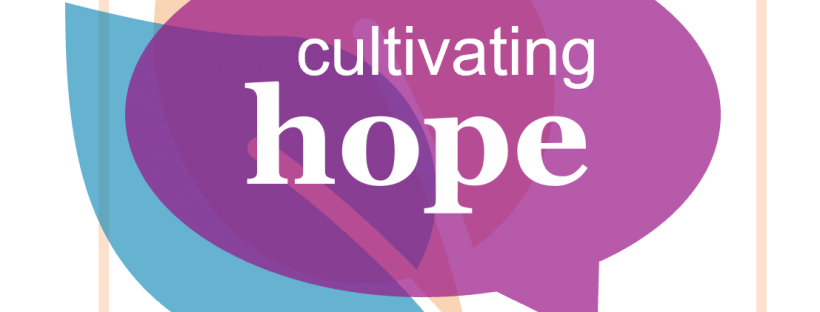In this video, Gilles Cantin talks about how educators can support parents and caregivers to be active contributors in their child’s learning. Share your questions and key takeaways in the comments below.
Category: Families
Communication and Collaboration/ La communication et la collaboration
Check out this article from the College of Early Childhood Educators! Let us know what you think in the comments below.
Update: TBDHU- Children Involved in Handling Food in Child Care
We have received some exciting news that programs may once again allow children to assist in preparing and handling food!
The Thunder Bay District Health Unit wishes to remind programs to adhere to the Guidelines for Food Handling for Children Please share this resource with your colleagues!
We know that our programs have missed these engaging opportunities for children and how important food preparation can be for fostering the Four Foundations! We can’t wait to hear about your cooking adventures.
For any further questions, feel free to reach out to the Public Health Inspector, whose phone number can be found at the bottom of the link to the guidelines document.
Impact of Positive, Quality Interactions/ L’impact d’interactions positives
Have a listen to Dr. Jean Clinton as she shares the importance of positive, caring and responsive interactions with educators, caregivers and parents. Tell us what you think of this video in the comments below!
Virtual tour with Abiinojiishiik-amino-yawook!
On behalf of the Child Care and Early Years team at TBDSSAB we want to say Chi Miigwetch to the incredible team at Abiinojiishiik-amino-yawook EarlyON Child and Family Centre. On Tuesday March 29th Sarah, Jennifer, Sabrina and Erica took us on a journey through their program during our first ever virtual tour gathering! They offered insight into who they are, their journey with embracing and implementing Indigenous culture into their programs and the special ways that make their team unique in our community! Through their insightful video, and the wholesome discussion period, we were able to learn alongside educators within our community and embrace the perspectives they bring to our Early Years field!
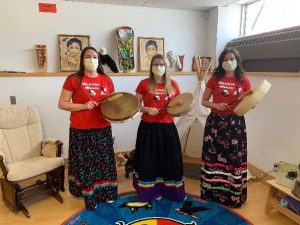
We are looking forward to our upcoming tours which will be happening throughout the Spring and Fall, stay tuned for updates! If you are interested in showcasing your program through a virtual tour, please let us know by emailing early.years@tbdssab.ca!
You can find the RECORDING LINK HERE! Please share your thoughts, reflections and questions in the comment section!😊
Miigwetch and Baamaapii!
Vaccine Bookings for 5-11 year olds in District Communities
The Thunder Bay District Health Unit (TBDHU) has arranged dedicated appointment times for children 5 to 11 in Manitouwadge, Marathon, Geraldton, Longlac, Nipigon, and Terrace Bay. See the following letters from the TBDHU for information on how to book a COVID-19 vaccine appointment for your 5 to 11 year old child.
2022 01 13 TBDHU letter to parents re VACCINE BOOKING DISTRICT English
2022 01 13 TBDHU letter to parents re VACCINE BOOKING DISTRICT French
Early Learning and Child Care Enabling Accessibility Funds
The Government of Canada is accepting applications for the Early Learning and Child Care small projects component under the Enabling Accessibility Funds. “The Early Learning and Child Care (ELCC) small projects component of the Enabling Accessibility Fund (EAF) aims to improve accessibility and safety in regulated and/or licensed ELCC centres. This will help support children with disabilities, parents/guardians with disabilities and/or employees with disabilities. The goal is to ensure that all Canadian families have access to high-quality, affordable and inclusive early learning and child care.”
The deadline to apply is January 28, 2022 at 5:00 p.m. See the Government of Canada website for more details: https://www.canada.ca/en/employment-social-development/services/funding/enabling-accessibility-fund-early-learning-child-care.html
There’s still time to register!
Save the Date!
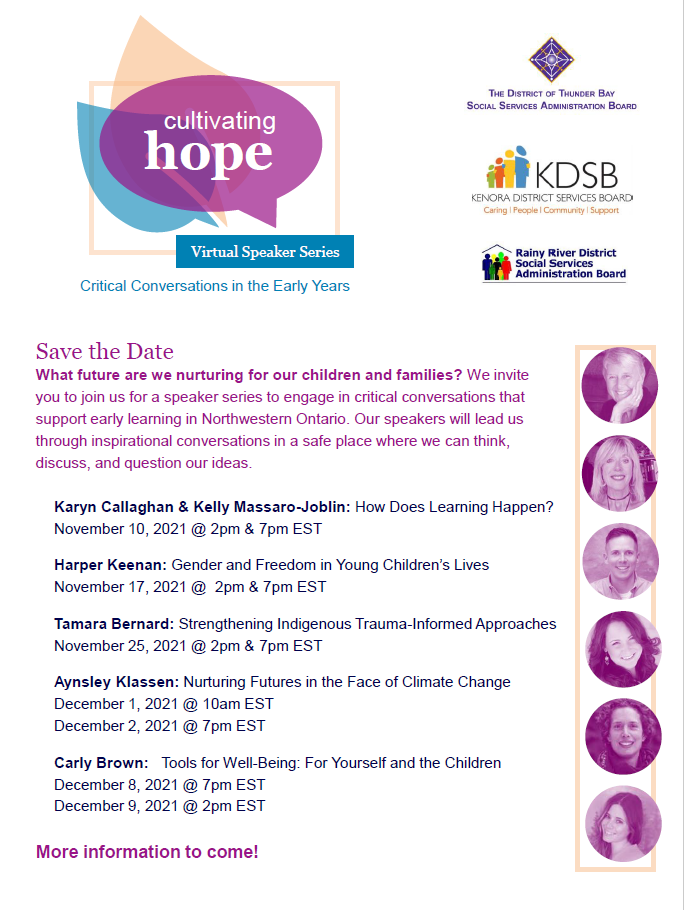
Save the Date: Cultivating Hope Virtual Speaker Series
What future are we nurturing for our children and families? We invite you to join us for a speaker series to engage in critical conversations that support early learning in Northwestern Ontario. Our speakers will lead us through inspirational conversations in a safe place where we can think, discuss, and question our ideas.
Karyn Callaghan & Kelly Massaro-Joblin: How Does Learning Happen?
November 10, 2021 @ 2pm & 7pm EST
Harper Keenan: Gender and Freedom in Young Children’s Lives
November 17, 2021 @ 2pm & 7pm EST
Tamara Bernard: Strengthening Indigenous Trauma-Informed Approaches
November 25, 2021 @ 2pm & 7pm EST
Aynsley Klassen: Nurturing Futures in the Face of Climate Change
December 1, 2021 @ 10am EST
December 2, 2021 @ 7pm EST
Carly Brown: Tools for Well-Being: For Yourself and the Children
December 8, 2021 @ 7pm EST
December 9, 2021 @ 2pm EST
More information to come!
Pedagogical Documentation
We had a wonderful conversation last week about pedagogical documentation. Three educators joined us who each play a different role in our community – one educator in child care, one supervisor of a before and after school program, and one EarlyON coordinator. This diversity of experience made for a unique dialogue and the opportunity to share different perspectives. We all read the article, Curiosity, Curriculum, and Collaboration Entwined: Reflections on Pedagogical Documentationby Pat Tarr.
As we discussed the article, an interesting dialogue came up around interrupting children’s play. Traditionally, we have been taught to ask children open-ended questions – “what are you building?” “what do you think will happen when you stack another block on top?” We felt that this can sometimes interrupt and change the direction of children’s play, and we agreed that we should be thoughtful in deciding when is a good time to enter children’s play and ask questions. It was said that we need to give ourselves permission to take a step back and observe more.
As the conversation continued, we began thinking about how educators pick and choose what they feel is worth documenting. Tarr (2010) states in the article that “what we choose to document reveals and reflects back to us what we consider important, as well as help us to see ourselves as educators within the educational relationship” (p. 12). This conversation reminded some of us about another article by Pat Tarr that talked about ethics and biases in pedagogical documentation. We shared mixed feelings about this article, and some of us plan to dig a little deeper to decide if or how the information fits with our practice. You can access the article here: Reflections and Shadows: Ethical Issues in Pedagogical Documentation,.
Finally, one of the educators bravely shared her documentation with us. She wondered, “is this documentation?” There isn’t one right way to document children’s learning; taking time to practice documenting and experimenting with different techniques can help educators to feel more confident. We discussed our questions and curiosities about this documentation, and a new idea was shared about “stories from home” (Hedges, 2010). Essentially, “stories from home” is a form that goes home for families to fill out and share a story that took place with their child outside of the early learning setting – it’s getting the families to document!! We discussed that this would be a great way of getting to know children and families better, and building stronger connections between, for example, child care and home.
Let us know what you think about these ideas or about the articles provided in the chat below.
References
Hedges, H. (2010). Blurring the boundaries: Connecting research, practice and professional learning. Cambridge Journal of Education, 40(3), 299-314. http://dx.doi.org/10.1080/0305764X.2010.502884
Tarr, P. (2010). Curiosity, curriculum, and collaboration entwined: Reflections on pedagogical documentation. Canadian Children, 35(2), 10-14.
Tarr, P. (2011). Reflections and shadows: Ethical issues in pedagogical documentation. Canadian Children, 36(2), 11-16.

